|
By: Tevyn East, Jay Beck, and Tim Nafziger 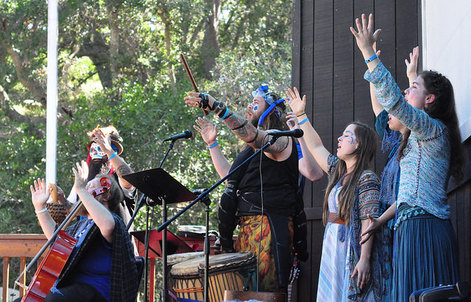 Photo Credit: Tim Nafziger Photo Credit: Tim Nafziger In one way or another, all of us working for social change seek to turn the world upside down and topsy turvy. It’s a vision that goes all the way back to Mary’s Magnificat. What would happen if we actually sought to incarnate that vision of our world turned on its head? Imagine a band of holy fools: living between worlds, threading church into Big Top dream and big band protest. They are creating space to deviate from the norm, to shape-shift through characters, to re-approach the old sacred stories from the groan of creation to a radical reclamation of the earthy truth within the Gospel narratives. They are topsy-turvy tight-rope walkers entwined between the worlds of faith, art and activism, dream-makers jesting on a grand scale. Their cross-cultural and mixed-media inspiration surges at the intersection of ancient and contemporary, of flesh and spirit, resounding in mythopoetic, syncretistic, voices of the sacred. They weave the elements, let the symbols speak, and call all to dance with the drum. This is the experiment we call the Carnival de Resistance.
Comments
By: Nichola Torbett 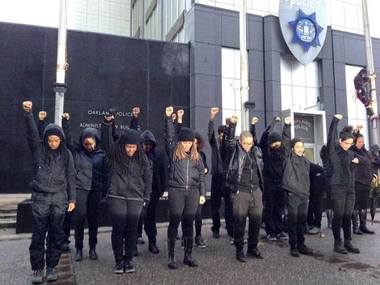 Group calling themselves "Black and Breathing" lead an action which shut down the Oakland Police Department for four hours 28 minutes. Photo Credit: Wazi Davis Group calling themselves "Black and Breathing" lead an action which shut down the Oakland Police Department for four hours 28 minutes. Photo Credit: Wazi Davis During the summer between third and fourth grade, I moved with my mom and sister into a new school district. In my new fourth grade classroom that fall, one student was designated each day to take the attendance slip from the teacher, leave the room, and…do something. All I knew is that the chosen one would come back a few minutes later without the little pink slip. After a few weeks, my turn came. I took the little pink slip, walked out the door as I had seen other kids do, and had no idea what to do. Now, at this point, you may be wondering why I didn’t just ask the teacher where I was supposed to go with it. That is exactly what another teacher asked me when she found me wandering the halls in tears several minutes later. I didn’t have an answer then, but looking back, I can see that by the age of nine, I had already figured out that I was supposed to know things, that knowledge was not only power but protection from being taken advantage of. To this day, it is hard for me to ask for directions. In unfamiliar neighborhoods, I duck into alleys so that no one will see me consult the map, and I am adept at reading subway maps surreptitiously out of the corner of my eye. When someone gives me information, I am always tempted to tell them that I already knew that. Being a knower feels safe to me, and yet I am coming to see that, like so many other forms of safety and invulnerability, being a knower is a trap. It’s a trap especially for me as a white cis-gendered person with middle class connections and especially when it comes to Kingdom justice. Let me explain. 2/20/2014 Comments Misplaced Seminary Part 2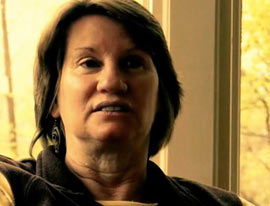 In 2001, Joyce Hollyday; a theologian, minister and author; joined with other folks to begin Word and World, “an experiment in alternative theological education – bridging the gulf between the seminary, the sanctuary and the street”. Word and World; inspired by freedom schools, popular education, William Stringfellow’s alternative seminary on Block Island, and Dietrich Bonhoeffer’s alternative seminary Finkenwalde; began as series of seven “schools” or weeklong retreats that met in cities across the US. The schools focused on four major movements: the black liberation and civil rights movement, liberation theology and borderland justice, the disarmament and nonviolent resistance movement, and feminist, womanist, and LGBT liberation theologies. After organizing these “movable feasts”, Word and World facilitated a year-long mentoring program for folks under 30 that included three group retreats, a reading curriculum that covered much of the material covered in the schools, writing assignments and service. 7/9/2013 Comments The Misplaced Seminary Part 1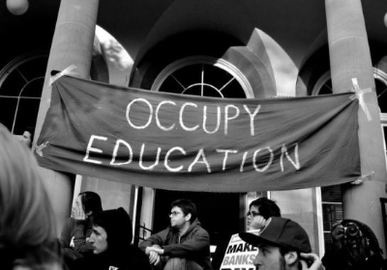 American college tuition is rising at twice the rate of inflation.1 The average student loan debt has climbed to nearly $25,000.2 And according to a study cited by Anya Kamenetz in her book DIY U, public university tuition would cost the poorest one fifth of Americans 55 percent of their income.3 Government subsidies for education are championed as the solution to these problems. It is one of Barak Obama’s second term promises that he will be “giving everyone a shot at an education.”4 The truth is the university has developed multiple cost-shifting strategies to handle recession. It is the university’s practice to raise tuition, court out-of-state students, and increase class size when government grants dwindle during difficult economic periods. The modern university has a steady flow of funds but a poor understanding of stewardship. Even by free market standards, the university’s business practices are opaque. People who can afford to go to school can’t find out what their ever-increasing tuition is actually paying for. Recruiters boast that class sizes are being reduced and distinguished professors are being hired. But education watchdogs have found that tuition is often being funneled into marketing departments and new campus gyms while under-paid adjuncts teach to classes of over 100 students.5 If this were any other business and the quality of the product was deteriorating but the cost was rising, the consumer would no longer purchase the product. 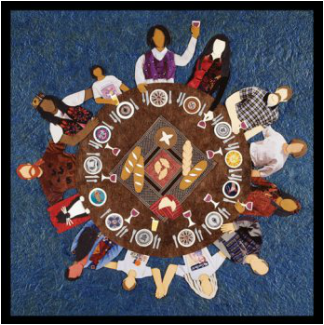 There are many models for uprooting oppression in our communities. To offer one of many, the Hosanna! People’s Seminary approach is to discern particular areas of privilege and poverty within a community through a three part process: awareness of privilege and oppression in the community; accountability in the community to the oppressed party and to the continued education and development of the privileged party through ally training; and solidarity in relationship with the oppressed party or those allying with the oppressed party outside of the community. For example, a group committed to rooting out ableism in their community and work would first grow in awareness of any ability-based disparities in privilege in the circle. To assist them in this task, they may seek out the help of an anti-oppression trainer, a trusted advisor, or a tool such as an accessibility audit. |
Disclaimer
The viewpoints expressed in each reader-submitted article are the authors own, and not an “official Jesus Radicals” position. For more on our editorial policies, visit our submissions page. If you want to contact an author or you have questions, suggestions, or concerns, please contact us. CategoriesAll Accountability Advent Anarchism Animal Liberation Anthropocentrism Appropriation Biblical Exegesis Book Reviews Bread Capitalism Catholic Worker Christmas Civilization Community Complicity Confessing Cultural Hegemony Decolonization Direct Action Easter Economics Feminism Heteropatriarchy Immigration Imperialism Intersectionality Jesus Justice Lent Liberation Theology Love Mutual Liberation Nation-state Nonviolence Occupy Othering Pacifisim Peace Pedagogies Of Liberation Police Privilege Property Queer Racism Resistance Resurrection Sexuality Solidarity Speciesism Spiritual Practices Technology Temptation Veganism Violence War What We're Reading On . . . White Supremacy Zionism ContributorsNekeisha Alayna Alexis
Amaryah Armstrong Autumn Brown HH Brownsmith Jarrod Cochran Chelsea Collonge Keith Hebden Ric Hudgens Liza Minno Bloom Jocelyn Perry Eda Ruhiye Uca Joanna Shenk Nichola Torbett Mark VanSteenwyk Gregory Williams Archives
October 2017
|
Search by typing & pressing enter

 RSS Feed
RSS Feed